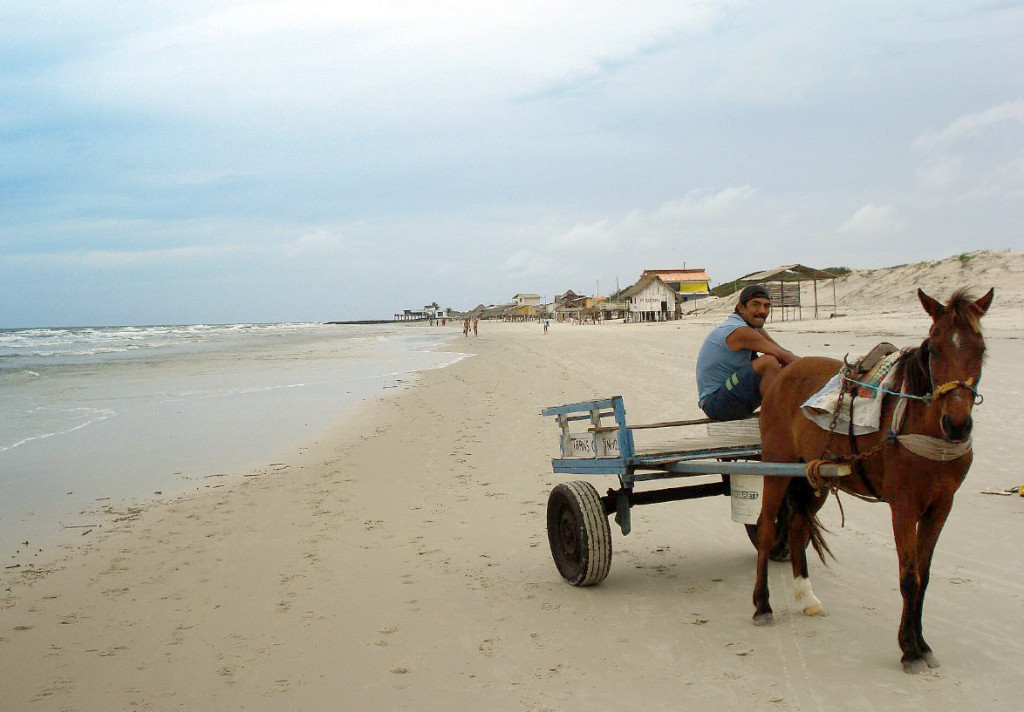
On Ilha de Algodoal a horse and cart waits on the beach for passengers. Photo © Papy Leite, licensed Creative Commons Attribution.
By bus or car and by boat, there are several interesting side trips you can make within the vicinity of Belém. The most popular destinations are the beaches along the banks of the region’s rivers. Avoid the dirty and crowded ones closest to the city itself, and avoid weekends, when most beaches are swarmed by day-tripping Belenenses.Only 25 kilometers (16 miles) north of the city (local buses marked “Icoaraci” pass along Av. Presidente Vargas), Icoaraci is a pleasant river town renowned for its ceramic workshops. Dozens of potters have kept alive the techniques and forms of the distinctive pottery made by the Marajoara Indians. Aside from replicas of the creamy white and red vessels adorned with geometric and primitive motifs, there are also some strikingly original designs. Although the pieces are fragile, the potters are as good at packing as they are at sculpting.
Also not to be missed is a meal at Na Telha (Rua Siqueira Mendes 363, tel. 91/3227-0853, 11 a.m.–4 p.m. and 6–10 p.m. Mon.–Fri., 11 a.m.–10 p.m. Sat.–Sun., R$20–30). This local restaurant is famed for its delectable fresh fish dishes—such as filhote bathed in a sauce of shrimp—cooked on a piping hot telha (red ceramic roofing tile). For starters, order the delicious bolinhos de pirarucu.
For a beach trip you can do in a day, your best bet is Ilha de Mosqueiro, 70 kilometers (44 miles) east of Belém, which has some attractive sandy beaches, particularly once you get away from the little town of Vila Mosqueiro. From the town’s main square, you can catch local buses to beaches such as Praia Morubira and Praia Marahú. The most unspoiled of all is Praia do Paraíso, where you’ll encounter white sands fringed by green vegetation and clean, emerald waters for bathing.
Should you want to spend the night, the Hotel Farol (Praça Princesa Isabel 3295, tel. 91/3771-2095, R$100–150 d) is a once-grand early-20th-century hotel that was a favorite retreat of Belém’s rubber barons. Facing the attractive Praia do Farol, the simple but spotless guest rooms are divided between the original building and a more modern annex. Opt for the former, with its curving walls, sweeping hallways, polished marquetry, and bay windows overlooking a tropical garden and the beach. An atmospheric restaurant with columns and wonderful tiled floors serves simple home-cooked dishes such as shrimp frittata.
Getting to Mosqueiro, connected by a bridge to the mainland, is easy from Belém. Frequent buses (45 minutes, R$4) leave daily from the Rodoviária. By car, just follow well-paved BR-316.
The finest beaches within reach of Belém are the primitive windswept dunes that ring the idyllic Ilha de Algodoal. Due to its distance from Belém (a five-hour trip), visiting Algodoal involves staying at least one night. Once you arrive, though, you likely won’t be in a hurry to leave. The island’s name is inspired by the abundance of a native plant known as algodão de seda (silk cotton). Its pods release fluffy white down that often wafts around the island like stray snowflakes. Fishing communities only settled here in the early 20th century, and to this day, the island’s quartet of tiny fishing towns (the largest of which is Algodoal) are terribly bucolic and laid-back. Water is pumped from natural wells, electricity only arrived in 2005, and transportation is by bike, boat, or horse (there are no motorized vehicles—or banks, for that matter, so stock up on cash before coming). There are, however, abundant idyllic beaches, freshwater lagoons, lily-pad covered marshes, and unspoiled native vegetation. The islanders are hospitable, and the only interruption to the tranquility that reigns is the infectious rhythm of carimbó, a local dance set to pounding log-like drums that originated with the African slaves that came to coastal Pará in the 17th century.
Various rustic pousadas and camping grounds have sprung up to meet the demands of young backpackers and savvy ecotourists (during holiday periods, you should reserve accommodations in advance). Most pousadas are located in and around the village of Algodoal itself, which is close to the island’s most beautiful beaches—Praia do Farol and Praia da Princesa. The aptly named Jardim do Eden (tel. 91/9997-0467, R$125 d) is immersed in the untamed natural landscape of Praia do Farol. Atmospheric lodgings are in bungalows made from old bricks and volcanic rock. All possess small kitchens and sleeping room for up to five people. The restaurant serves delicious breakfasts as well as very good fish and seafood dishes. The owners, a hospitable and multilingual Brazilian-French couple, can organize all sorts of outings: from fishing and canoeing trips to nature walks where you can spot monkeys, tortoises, and wild orchids in bloom. More central is the Pousada Chalés do Atlântico (Rua Bertoldo Costa 33, Quadra 12, Centro, tel. 91/3854-1114, R$90–180 d), whose apartments and individual chalets, which sleep up to four, are scattered amid a bucolic garden strewn with fruit trees, only three minutes from the beach. Accommodations are simple but cared for. The restaurant serves lip-smacking regional fare.
Ilha de Algodoal is 163 kilometers (101 miles) northeast of Belém. From Belém’s Rodoviária, Rápido Excelsior (tel. 91/3246-3636) operates five buses daily to the town of Marudá (3.5 hours, R$20), where you can catch a boat (tel. 91/8146-5091, 40 minutes, R$6) to the island. There are four departures daily during the week and five on weekends (9 a.m.–5 p.m.) with an 8 p.m. departure on Friday. Driving from Belém, take well-paved BR-316, PA-136, and PA-318 to Marudá, where you can leave your car in a parking lot for R$5 per day.
Excerpted from the Third Edition of Moon Brazil.